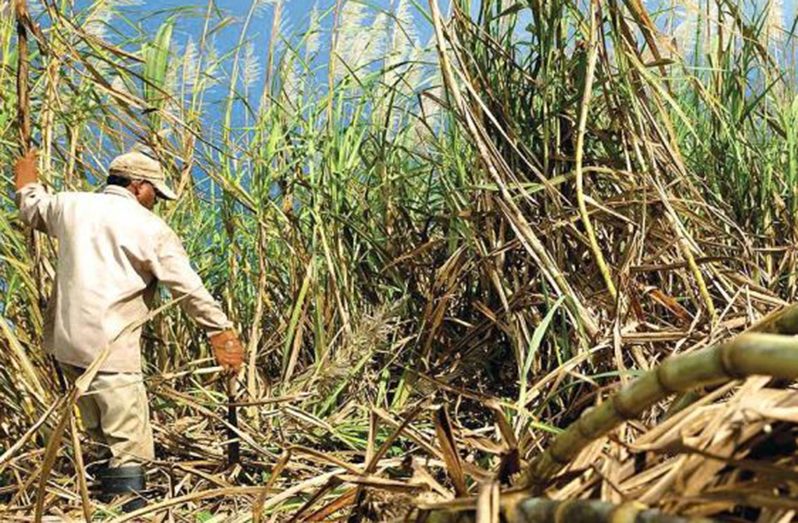GUYANA’S growing dependence on commodity exports must be accompanied by carefully-designed efforts to diversify the economy in ways that would counterbalance the price volatility that often characterises commodity markets.
This is the conviction of Dr. Thomas Singh, Director of the University of Guyana’s GREEN Institute, who authored a United Nations-supported study into the closure of four of Guyana’s sugar estates and its socio-economic impact on more than 5000 dismissed sugar workers.

The study, conducted in partnership with the International Labour Organisation (ILO), has recognised the negative impact that unstable world market prices would have had on export commodities such as bauxite and sugar.
“In both instances, policy makers who were confronted with the need to provide financial support to the loss-making industries eventually recognised that some action, privatisation or closure, was warranted,” the report notes.
It states definitively that there will have to be diversification into non-commodity sectors, taking appropriate cognisance of the tendency for commodity production and the “oil bonanza in particular,” to reduce the competitiveness of these other sectors.
The 110-page document also outlines the challenges to diversification, which include “the temptation to underestimate, if not overlook, the riskiness of new activities, precisely because Guyana will become wealthier, and the State can, therefore, better afford to underwrite projects.”
It also takes into consideration the high cost and poor quality of energy, and the (sometimes) severe shortage of human capital, along with the high cost of doing business in Guyana, and the relatively small (domestic) market for the goods and services that Guyana can produce.
“A National Investment and Diversification Strategy shall go beyond identifying sectors or activities for investment, to take account of the challenges mentioned…and clearly identify the respective functions of the government, the private sector, labour and civil society,” the report notes.
As the People’s Progressive Party Civic (PPP/C) Government moves to gradually reopen the four sugar estates which were closed by the former A Partnership for National Unity + Alliance for Change (APNU+AFC) administration, Dr. Singh has emphasised the need for this to be done in a manner that is sustainable.
In his recommendations, the local economist also pointed to the advancement of cellulosic ethanol production as a source of renewable, low-carbon energy that could possibly boost the very profitability of the sugar industry.
“Consideration must also be given to developing a bio-refinery to produce other high-valued chemicals from lignocellulose, both as a strategy for reducing costs, and also for further diversifying the industry,” Dr. Singh noted.
He said that biorefineries would make use not only of bagasse, but will also use other kinds of biomass, including rice straw, saw-dust, etcetera. This, he explained, will also allow for the production of several commercial-scale, high-valued co-products that will enhance the profitability of the core cellulosic ethanol facility.
He noted that this is likely to reduce the production costs of sugar even further. Dr. Singh said, too, that the scope for developing relevant programmes of biotechnology research and teaching at institutions such as the University of Guyana is significant.
“…both as a matter of supporting a cellulosic ethanol and biorefinery sector, and also as a matter of developing the University of Guyana, beginning perhaps with a graduate programme in biotechnology,” Dr. Singh noted.
He also pointed to the tendency of “dominance” that the oil sector has, and its ability to undermine the competitiveness of traditional exports, while supressing the emergence of new exports. To this end, Dr. Singh emphasised the need for the government to provide incentives and fiscal support to new exports.
The extensive report also addresses the issue of climate change, and the need for all sectors to become sustainable, and operate in a manner that protects the environment. It points specifically to a system for the granting of credits for emissions reductions to investors, commensurate with their equity holdings.
“This will allow private sector firms, and especially the major investors, to earn valuable carbon credits,” Dr. Singh said.
Also critical to the reopening of the sugar estates, Dr. Singh said, is the need for greater stakeholder involvement and consultation, both as a matter of good governance but more so as a way to garner information about people’s expectations, perceptions and intended behaviour.
“This is extremely important as the oil-and-gas sector becomes more dominant in the economy. Quite apart from the fact that there was limited stakeholder involvement and consultation in the decision to close the sugar estates, there is still a need for consultation with sugar workers, especially those who were laid off, on what they require to sustain their livelihoods,” Dr. Singh noted.
He admitted that not everyone would want to return to the sugar industry, as have already sought alternative employment. “It would even be appropriate to consider conducting a comprehensive survey and scenario analysis of the needs and expectations of sugar workers affected by the closure of the sugar estates,” the report advised.
Dr. Singh believes that such as survey will enable the government to not only respond to the skills-training needs of the dismissed workers, but garner a greater sense of the number of workers that are willing to return to the sugar industry, and at what wages.
During the launch of the study on Thursday last, Senior Minister in the Office of the President with responsibility for Finance, Dr. Ashni Singh committed to ensuring that the recommendations are implemented, wherever possible.




.png)









